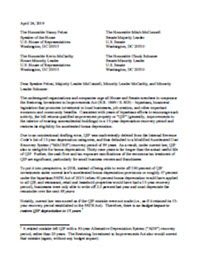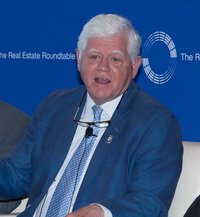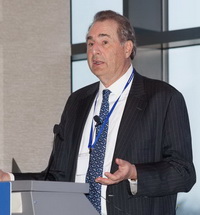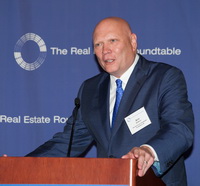The Real Estate Roundtable and a coalition of more than 100 business organizations yesterday sent a letter to Senate and House tax writers supporting legislation that would permanently extend the new 20 percent deduction for qualified pass-through business income. (Coalition letter, April 11)
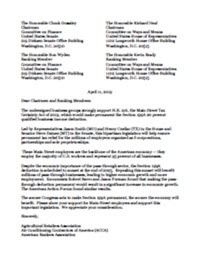 |
|
The Real Estate Roundtable and a coalition of more than 100 business organizations yesterday sent a letter to Senate and House tax writers supporting legislation that would permanently extend the new 20 percent deduction for qualified pass-through business income. |
- Sen. Steve Daines (R-MT) introduced the Main Street Tax Certainty Act yesterday (S. 1149) to make the deduction permanent. The Senate bill mirrors legislation introduced in the House (H.R. 216) by Reps. Henry Cuellar (D-TX) and Jason Smith (R-MO).
- The 20 percent deduction for pass-through business income (under Internal Revenue Code section 199A) is one of the most important – and complex – elements of the 2017 tax overhaul law. The deduction was designed to provide relief to the 30 million businesses in the United States that are not C corporations, and thus don’t benefit from the corporate tax cut. It is currently scheduled to sunset at the end of 2025.
- The coalition letter states that the House and Senate bills to make the deduction permanent will help ensure tax relief for the millions of employers organized as partnerships, S corporations, and sole proprietorships. “Repealing this sunset will benefit millions of pass-through businesses, leading to higher economic growth and more employment,” according to the letter.
- The Treasury Department on Jan. 18 issued final regulations and new guidance on the 20 percent deduction. Proposed regulations issued alongside the final rules ensure that investors who receive REIT dividends indirectly through an interest in a mutual fund are eligible for the pass-through deduction. (Roundtable Weekly, Jan. 25, 2019)
- Yesterday, the IRS released a fact sheet (FS-2019-8) on the new section 199A deduction. Among the topics addressed are the qualified business income component, qualified real estate investment trust (REIT) dividends and qualified publicly traded partnership (PTP) income. (IRS news release, April 11)
The Section 199A deduction was a key topic of Roundtable President and CEO Jeffrey DeBoer’s testimony before the Senate Finance Committee in the fall of 2017, shortly before lawmakers released the first version of their tax overhaul. The Roundtable was closely involved in the legislative development of the provision. (Roundtable Weekly, Sept. 22, 2017)
